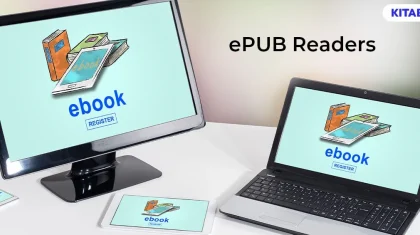
Top eBook Analytics Tools to Improve Reader Engagement
Summarize this blog with your favorite AI:
As the interactive eBook format grows in popularity, more publishers are embracing this medium. eBook revenues are expected to reach $14.92 billion in 2025 and increase to $15.69 billion by 2029 when the number of eBook readers will rise to 1.2 billion. However, several companies will compete for market space. Those who can effectively predict user needs and innovate quickly can gain a competitive edge.
Access to superior Data Analytics will play an important role in this race. Adopting eBook content analysis tools can help publishers completely transform their user engagement and drive revenues. For instance, leveraging KITABOO‘s Learning Analytics Dashboard can help publishers derive real-time eBook insights and more effectively meet their goals.
In this blog, we review the top tools in the marketplace to help businesses make well-informed decisions when choosing solutions.
Table of Contents:
I. What are eBook Analytics Tools?
II. Top 5 eBook Analytics Tools
III. 4 Benefits of Using eBook Analytics Tools
- In-Depth Access to eBook User Analytics
- Predict Future Trends
- Personalized User Experiences
- Agile Content Development and Distribution
IV. The Takeaway
What are eBook Analytics Tools?
eBook analytics tools are software solutions that enable digital publishers to track user engagement and measure eBook success. As publishers grow their eBooks vertical, superior data analytics is playing an increasingly important role in helping publishers gain a competitive edge in a crowded market space.
As of 2024, the global Data Analytics software revenues amounted to $69.54 billion in 2024. This figure is estimated to grow to $ 302.01 billion by 2030.
Due to this demand, content analysis tools have undergone a series of innovations, from harnessing the power of artificial intelligence (AI) to real-time analytics and data visualization.
Embracing superior analytics tools, such as KITABOO’s Learning Analytics Dashboard, can help publishers better understand their audience. They can then shape their editorial, marketing, and distribution strategies accordingly and capture more market share.
The Top 5 eBook Analytics Tools
A snapshot of the top eBook analytics tools in the marketplace today:
1. KITABOO’s Learning Analytics Dashboard
This is a centralized depository of data, which provides publishers with an overview of all aspects of eBook statistics. This AI-powered tool automatically aggregates, visualizes, and analyzes data in-depth and delivers superior eBook insights to the publishers.
For instance, digital publishers can access data on key performance indicators (KPIs) and metrics such as:
- Engagement on pages and multimedia elements
- Amount of time spent
- Log-in and log-out timings
- Reader demographics
- Geographical footprint
- Popular genres
- Popular eBook formats
- Preferred user browsers, devices, and operating systems
- Preferred user distribution channels
Access to such valuable data insights enables publishers to better understand their user base. They can then make data-driven decisions about content creation, publishing, and distribution, which will collectively help boost reader engagement.
A key advantage of using KITABOO’s Learning Analytics Dashboard is that it is specifically designed to support digital publishers in tracking the success of products such as eBooks.
2. Tableau
Data visualization tool Tableau enables organizations to optimize their potential through the power of actionable Data Analytics. Digital publishers can also take advantage of its visual features to track, measure, and analyze the success of eBooks.
Key features include visual charts and graphs that enable organizations to process information quickly and effectively. The tool’s drag-and-drop functionality makes the experience interactive. It also enables the blending of data from multiple sources into one cohesive database.
3. Zoho Analytics
This tool comprehensively manages and analyses data from multiple sources. The data insights can be reported in the mode of one’s preference, ranging from data visualization to spreadsheet-like interfaces. Reports can be easily shared with others, making it a good product for all large-scale organizations. Owners have complete control of access with options such as “read-only”, “read-write”, and “drill-down”.
4. Qlik Sense
This AI and ML-powered tool assimilates data from multiple sources, processes, analyzes, and converts them into data-visualized content. Reports come with automatically AI-generated insights based on historical data. Users can reap the benefits of conversational analytics, interactive dashboards, and self-service visualization tools.
5. Microsoft Power BI
This is Microsoft’s data visualization tool designed to power superior data analysis for businesses. This product can be easily integrated with other Microsoft products, offering an ecosystem advantage. Businesses can reap the benefits of real-time access to information customizable that dashboards mobile access and high data security.
4 Benefits of Using eBook Analytics Tools
Digital publishers can greatly benefit from the adoption of eBook analytics tools in the following ways:
1. In-Depth Access to eBook User Analytics
Publishers can track and measure every aspect of eBook consumption. Hence, all content development, creation, publishing, and distribution decisions can be driven by concrete data rather than assumptions and human bias. Publishers can shift to a contemporary data-driven decision-making culture that improves reader engagement.
2. Predict Future Trends
Contemporary eBook analytics tools leverage the power of AI and ML to power predictive analytics. This functionality enables digital publishers to forecast future trends based on historical data. Digital publishers can shape their eBook development and distribution strategies more effectively to drive the desired outcomes.
3. Personalized User Experiences
The use of AI is also enabling publishers to personalize the reading experience for readers. Hence, personalization is an important by-product of superior reader analytics, which can transform and boost reader engagement.
4. Agile Content Development and Distribution
With access to powerful data analytics, digital publishers can innovate much faster and stay agile to the evolving trends. They can execute changes even to newer editions of eBooks quickly and effectively. They can also upgrade older eBooks and ensure that they stay relevant to newer generations.
The Takeaway
Access to superior reader analytics is any publisher’s secret weapon. By leveraging the power of predictive Data Analytics, eBook publishers can forecast future trends and shape their creative policies based on historical data.
For instance, by adopting eBook analytics solutions such as KITABOO‘s cloud-based Learning Analytics Dashboard, publishers can dissect user behavior and patterns, personalize their products, and stay completely agile to emerging trends.
Digital publishers can transform eBook user engagement levels by leveraging superior data analytics. KITABOO’s cloud-based Learning Analytics Dashboard enables publishers to comprehensively monitor user engagement, predict trends, and effectively shape their editorial policies.
Connect with us now to start a conversation.
Also Check:
Discover how a mobile-first training platform can help your organization.
KITABOO is a cloud-based platform to create, deliver & track mobile-first interactive training content.



